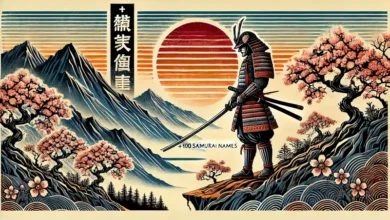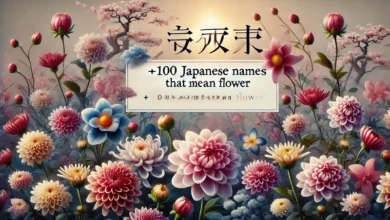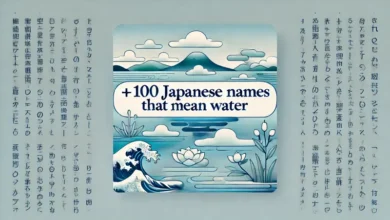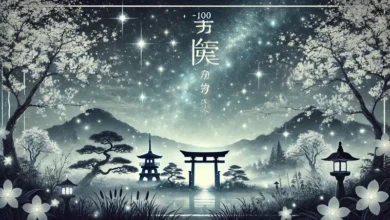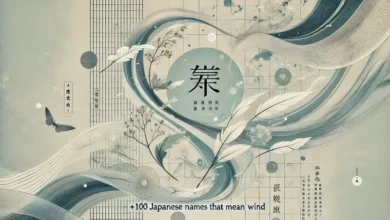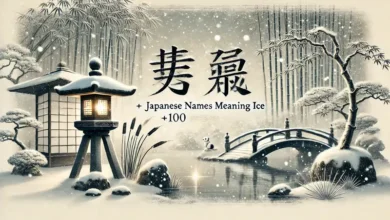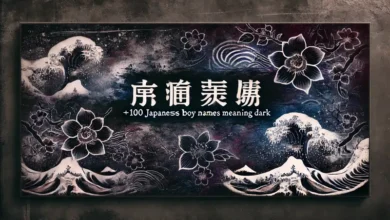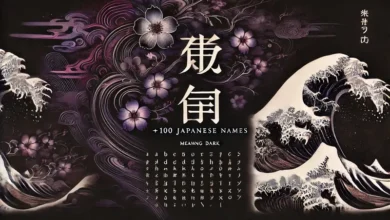Japanese Names
Japanese Names That Mean Love (+150 Girl, Boy,… Names)
For copy name or description, please click on that!
| Name | Description |
|---|---|
Aiaya (愛彩) | "Love" (愛) and "colorful" (彩), representing a vibrant love. |
Aisato (愛里) | "Love" (愛) and "village" (里), symbolizing a community or place of love. |
Aikou (愛航) | "Love" (愛) and "voyage" (航), representing a love that is adventurous. |
Aiuta (愛詩) | "Love" (愛) and "poem/song" (詩), symbolizing a love that is poetic. |
Aisho (愛晶) | "Love" (愛) and "crystal" (晶), symbolizing a clear and pure love. |
Ever wondered about the beautiful meanings behind Japanese names? Many Japanese names carry deep significance, reflecting cultural values, historical events, or personal aspirations. In this article, we’ll explore a special theme: Japanese names that express the universal emotion of love. Let’s dive into the world of these heartwarming names and discover the stories they tell.
Girl Japanese Names That Mean Love
- Ai (愛) – Simple and direct, meaning “love.”
- Aimi (愛美) – Combines “love” (愛) with “beauty” (美).
- Aika (愛花) – “Love” (愛) and “flower” (花), symbolizing love blossoming like a flower.
- Aiko (愛子) – “Love” (愛) and “child” (子), meaning “child of love.”
- Airi (愛莉) – “Love” (愛) and “jasmine” (莉), a fragrant flower symbolizing affection.
- Aiho (愛帆) – “Love” (愛) and “sail” (帆), representing a journey of love.
- Aina (愛菜) – “Love” (愛) and “greens” (菜), symbolizing nurturing love.
- Aito (愛鳥) – “Love” (愛) and “bird” (鳥), suggesting a free and soaring love.
- Ainae (愛音) – “Love” (愛) and “sound” (音), symbolizing the harmonious sound of love.
- Aiha (愛羽) – “Love” (愛) and “feather” (羽), symbolizing a light and gentle love.
- Aitsuki (愛月) – “Love” (愛) and “moon” (月), representing a serene and enduring love.
- Aiharu (愛春) – “Love” (愛) and “spring” (春), indicating love that blooms like spring.
- Aizuki (愛月) – “Love” (愛) and “moon” (月), representing a love that shines in the dark.
- Aihoshi (愛星) – “Love” (愛) and “star” (星), symbolizing a love that is as vast as the stars.
- Aiuru (愛雨) – “Love” (愛) and “rain” (雨), symbolizing love that is gentle and nurturing.
- Aikae (愛香) – “Love” (愛) and “fragrance” (香), representing a love that lingers.
- Aizumi (愛澄) – “Love” (愛) and “clear/pure” (澄), symbolizing a pure and transparent love.
- Aine (愛寧) – “Love” (愛) and “peace” (寧), symbolizing a peaceful and calm love.
- Airoha (愛路) – “Love” (愛) and “path” (路), indicating a path of love.
- Aimiya (愛宮) – “Love” (愛) and “palace/shrine” (宮), representing a sacred love.
- Aiwa (愛和) – “Love” (愛) and “harmony” (和), indicating a harmonious love.
- Aiuta (愛詩) – “Love” (愛) and “poem/song” (詩), symbolizing a love that is poetic.
- Aiyuki (愛雪) – “Love” (愛) and “snow” (雪), representing a pure and serene love.
- Aiyuri (愛百合) – “Love” (愛) and “lily” (百合), symbolizing pure and graceful love.
- Aihoshi (愛星) – “Love” (愛) and “star” (星), indicating a love that is guiding.
- Aitsune (愛恒) – “Love” (愛) and “eternal” (恒), symbolizing an eternal love.
- Aikaze (愛風) – “Love” (愛) and “wind” (風), representing a love that is ever-present.
- Aihana (愛華) – “Love” (愛) and “flower” (華), symbolizing a flourishing love.
- Aiouka (愛桜) – “Love” (愛) and “cherry blossom” (桜), representing a delicate and beautiful love.
- Aiyu (愛優) – “Love” (愛) and “gentleness” (優), symbolizing a kind and gentle love.
- Aiaya (愛彩) – “Love” (愛) and “colorful” (彩), representing a vibrant love.
- Aikane (愛鐘) – “Love” (愛) and “bell” (鐘), symbolizing a love that resonates.
- Aisaka (愛咲) – “Love” (愛) and “bloom” (咲), indicating a love that blooms beautifully.
- Aikoha (愛琥) – “Love” (愛) and “amber” (琥), representing a warm and glowing love.
- Aineko (愛猫) – “Love” (愛) and “cat” (猫), symbolizing a love that is independent and caring.
- Aikumi (愛久美) – “Love” (愛) and “long-lasting beauty” (久美), indicating a love that endures.
- Aiyumi (愛弓) – “Love” (愛) and “bow” (弓), symbolizing a love that is direct and strong.
- Aitsuru (愛鶴) – “Love” (愛) and “crane” (鶴), representing a long-lasting and graceful love.
- Aikiho (愛希望) – “Love” (愛) and “hope” (希望), symbolizing a hopeful love.
- Aizora (愛空) – “Love” (愛) and “sky” (空), representing a boundless love.
- Aihanae (愛華音) – “Love” (愛), “flower” (華), and “sound” (音), symbolizing a love that blooms and resonates.
- Aikura (愛紅) – “Love” (愛) and “deep red” (紅), symbolizing a passionate love.
- Aihina (愛日向) – “Love” (愛) and “sunny place” (日向), representing a warm and comforting love.
- Aiharu (愛遥) – “Love” (愛) and “distant/far-reaching” (遥), symbolizing a love that transcends distance.
- Aisora (愛昊) – “Love” (愛) and “vast sky” (昊), representing an expansive love.
- Aikumo (愛雲) – “Love” (愛) and “cloud” (雲), symbolizing a love that is soft and gentle.
- Aikaoru (愛薫) – “Love” (愛) and “fragrance” (薫), representing a love that is sweet and enduring.
- Aihoshiko (愛星子) – “Love” (愛), “star” (星), and “child” (子), symbolizing a cherished and bright love.
- Aiayame (愛菖蒲) – “Love” (愛) and “iris flower” (菖蒲), representing a graceful and noble love.
- Aiura (愛麗) – “Love” (愛) and “beauty” (麗), symbolizing a love that is elegant and beautiful.
Boy Japanese Names That Mean Love
- Aito (愛斗) – “Love” (愛) and “fight” (斗), representing a strong and determined love.
- Aisuke (愛介) – “Love” (愛) and “help/assist” (介), symbolizing a supportive love.
- Aihiko (愛彦) – “Love” (愛) and “prince” (彦), indicating a noble and loving nature.
- Aiyuki (愛幸) – “Love” (愛) and “happiness” (幸), symbolizing a love that brings happiness.
- Aiharu (愛晴) – “Love” (愛) and “clear sky” (晴), representing a bright and clear love.
- Aisora (愛空) – “Love” (愛) and “sky” (空), symbolizing a vast and limitless love.
- Aikazu (愛和) – “Love” (愛) and “harmony” (和), representing a harmonious love.
- Aiken (愛賢) – “Love” (愛) and “wisdom” (賢), indicating a wise and thoughtful love.
- Aitsune (愛恒) – “Love” (愛) and “eternity” (恒), symbolizing an everlasting love.
- Aiyuma (愛夢) – “Love” (愛) and “dream” (夢), representing a love that is like a dream.
- Aikiyo (愛清) – “Love” (愛) and “pure” (清), symbolizing a pure and clean love.
- Aiyori (愛頼) – “Love” (愛) and “trust” (頼), indicating a trustworthy love.
- Aihide (愛秀) – “Love” (愛) and “excellence” (秀), symbolizing an outstanding love.
- Aitsuyu (愛梅) – “Love” (愛) and “plum” (梅), representing a resilient love.
- Aiyasu (愛靖) – “Love” (愛) and “peace” (靖), symbolizing a peaceful and calm love.
- Aikyo (愛響) – “Love” (愛) and “resonance” (響), representing a love that resonates deeply.
- Aihiko (愛彦) – “Love” (愛) and “boy” (彦), indicating a pure and young love.
- Aiyoru (愛陽) – “Love” (愛) and “sun” (陽), representing a warm and life-giving love.
- Aihara (愛治) – “Love” (愛) and “rule/govern” (治), symbolizing a love that brings order.
- Aikazu (愛和) – “Love” (愛) and “peace” (和), indicating a peaceful and harmonious love.
- Aisumi (愛澄) – “Love” (愛) and “clear” (澄), symbolizing a transparent and clear love.
- Aiharu (愛陽春) – “Love” (愛), “sun” (陽), and “spring” (春), representing a love that brings warmth and new beginnings.
- Aitake (愛岳) – “Love” (愛) and “mountain” (岳), symbolizing a love that is strong and enduring.
- Aikei (愛敬) – “Love” (愛) and “respect” (敬), indicating a respectful and honorable love.
- Aihiro (愛博) – “Love” (愛) and “vast” (博), representing a vast and encompassing love.
- Aishin (愛真) – “Love” (愛) and “truth” (真), symbolizing a love that is sincere and true.
- Aiyoshi (愛吉) – “Love” (愛) and “good fortune” (吉), representing a love that brings good luck.
- Aikou (愛幸) – “Love” (愛) and “blessing” (幸), symbolizing a blessed and happy love.
- Aihiro (愛浩) – “Love” (愛) and “abundant” (浩), representing an abundant and generous love.
- Aitaka (愛孝) – “Love” (愛) and “filial piety” (孝), indicating a love that is dutiful and respectful.
- Aihide (愛秀) – “Love” (愛) and “excellent” (秀), symbolizing an exceptional love.
- Aikazuya (愛和也) – “Love” (愛), “harmony” (和), and “also” (也), representing a love that brings harmony to all.
- Aikichi (愛吉) – “Love” (愛) and “good luck” (吉), symbolizing a love that is fortunate.
- Aitsuru (愛弦) – “Love” (愛) and “string” (弦), representing a love that binds and connects.
- Aiharu (愛悠) – “Love” (愛) and “leisurely” (悠), symbolizing a relaxed and comfortable love.
- Aikyo (愛郷) – “Love” (愛) and “hometown” (郷), indicating a love that is connected to one’s roots.
- Aisora (愛蒼) – “Love” (愛) and “blue” (蒼), representing a deep and serene love.
- Aiyori (愛頼) – “Love” (愛) and “reliability” (頼), symbolizing a dependable love.
- Aishin (愛新) – “Love” (愛) and “new” (新), representing a fresh and renewing love.
- Aihiko (愛飛行) – “Love” (愛) and “flight” (飛行), symbolizing a love that soars.
- Aikou (愛航) – “Love” (愛) and “voyage” (航), representing a love that is adventurous.
- Aiharu (愛春) – “Love” (愛) and “spring” (春), symbolizing a love that is full of life.
- Aikazu (愛一) – “Love” (愛) and “one” (一), representing a singular, focused love.
- Aihaya (愛隼) – “Love” (愛) and “falcon” (隼), symbolizing a swift and keen love.
- Aiyuma (愛湧真) – “Love” (愛), “spring forth” (湧), and “truth” (真), representing a love that is genuine and ever-flowing.
- Aitaka (愛高) – “Love” (愛) and “high” (高), symbolizing a lofty and noble love.
- Aiyuto (愛優斗) – “Love” (愛), “gentle” (優), and “fight” (斗), indicating a love that is both gentle and strong.
- Aikage (愛影) – “Love” (愛) and “shadow” (影), representing a love that is subtle and protective.
- Aihiro (愛弘) – “Love” (愛) and “expand” (弘), symbolizing a love that grows and spreads.
- Aiyoshi (愛義) – “Love” (愛) and “righteousness” (義), representing a just and honorable love.
- Aizawa (愛沢) – “Love” (愛) and “swamp” (沢), indicating a place where love nurtures.
- Aihara (愛原) – “Love” (愛) and “field/plain” (原), symbolizing a vast field of love.
- Aikawa (愛川) – “Love” (愛) and “river” (川), representing a love that flows like a river.
- Aimoto (愛本) – “Love” (愛) and “origin” (本), meaning “origin of love.”
- Aida (愛田) – “Love” (愛) and “rice field” (田), representing a fertile place of love.
- Aisaka (愛坂) – “Love” (愛) and “hill/slope” (坂), symbolizing a love that endures challenges.
- Aino (愛野) – “Love” (愛) and “field” (野), representing a love that is natural and free.
- Aisaka (愛嶋) – “Love” (愛) and “island” (嶋), symbolizing a secluded and special place of love.
- Aihashi (愛橋) – “Love” (愛) and “bridge” (橋), representing a connection of love.
- Aizuki (愛月) – “Love” (愛) and “moon” (月), indicating a love that is serene and ever-present.
- Ainami (愛波) – “Love” (愛) and “wave” (波), symbolizing a love that moves and changes like the sea.
- Aikoshi (愛越) – “Love” (愛) and “crossing” (越), representing a love that transcends.
- Aisaka (愛坂) – “Love” (愛) and “slope” (坂), indicating a love that rises and grows.
- Aitsuki (愛月) – “Love” (愛) and “moon” (月), representing a mystical and constant love.
- Aitsuki (愛木) – “Love” (愛) and “tree” (木), symbolizing a love that is rooted and grows.
- Aihama (愛浜) – “Love” (愛) and “beach” (浜), indicating a love that is gentle and soothing like the shore.
- Aiseki (愛関) – “Love” (愛) and “barrier” (関), symbolizing a love that overcomes obstacles.
- Aikubo (愛窪) – “Love” (愛) and “hollow/valley” (窪), representing a deep and hidden love.
- Aizumi (愛住) – “Love” (愛) and “reside/live” (住), meaning “where love resides.”
- Aihara (愛原) – “Love” (愛) and “field/plain” (原), symbolizing a vast field of love.
- Aizumi (愛泉) – “Love” (愛) and “spring” (泉), indicating a love that springs forth.
- Aibara (愛原) – “Love” (愛) and “field” (原), representing a love that is wide and open.
- Aisato (愛里) – “Love” (愛) and “village” (里), symbolizing a community or place of love.
- Aizuka (愛塚) – “Love” (愛) and “mound/tomb” (塚), representing a place where love is remembered.
- Aizumi (愛角) – “Love” (愛) and “corner” (角), symbolizing love that reaches all corners.
- Aihama (愛浜) – “Love” (愛) and “shore” (浜), indicating a love that is enduring like the coastline.
- Aishima (愛嶋) – “Love” (愛) and “island” (嶋), symbolizing a place of isolated love.
- Aikuni (愛国) – “Love” (愛) and “country” (国), representing a patriotic love.
- Aizumi (愛隅) – “Love” (愛) and “corner” (隅), indicating a love that is hidden or reserved.
- Aihoshi (愛星) – “Love” (愛) and “star” (星), symbolizing a love that shines brightly.
- Aisaka (愛坂) – “Love” (愛) and “hill/slope” (坂), indicating a love that rises and endures.
- Aizumi (愛澄) – “Love” (愛) and “clear” (澄), representing a love that is pure and transparent.
- Aitaka (愛高) – “Love” (愛) and “high” (高), symbolizing a noble and lofty love.
- Aihashi (愛橋) – “Love” (愛) and “bridge” (橋), representing a love that connects.
- Aiyama (愛山) – “Love” (愛) and “mountain” (山), indicating a love that is solid and unwavering.
- Aihoshi (愛星) – “Love” (愛) and “star” (星), symbolizing a guiding and bright love.
- Aikuni (愛国) – “Love” (愛) and “nation” (国), representing a love for one’s country.
- Aihara (愛原) – “Love” (愛) and “plain” (原), symbolizing a love that is expansive and nurturing.
- Aizaki (愛崎) – “Love” (愛) and “cape” (崎), representing a love that is bold and exposed.
- Aizumi (愛済) – “Love” (愛) and “finish/settle” (済), indicating a love that completes or fulfills.
- Aihoshi (愛星) – “Love” (愛) and “star” (星), representing a love that is eternal and guiding.
- Aisaki (愛咲) – “Love” (愛) and “bloom” (咲), symbolizing a love that blossoms beautifully.
- Aikura (愛倉) – “Love” (愛) and “storehouse” (倉), representing a love that is preserved and cherished.
- Aihashi (愛橋) – “Love” (愛) and “bridge” (橋), indicating a love that bridges gaps.
- Aisumi (愛住) – “Love” (愛) and “reside” (住), meaning a place where love lives.
- Aizawa (愛澤) – “Love” (愛) and “swamp” (澤), symbolizing a love that nurtures and grows.
- Aiyama (愛山) – “Love” (愛) and “mountain” (山), indicating a love that is steadfast and enduring.
- Aikawa (愛川) – “Love” (愛) and “river” (川), symbolizing a love that flows and nurtures.
- Aisaki (愛崎) – “Love” (愛) and “promontory” (崎), representing a love that stands tall.
- Aihoshi (愛星) – “Love” (愛) and “star” (星), symbolizing a love that guides and inspires.
Unisex Japanese Names Meaning Love
- Aikao (愛香夫) – “Love” (愛) and “fragrant man” (香夫), symbolizing a love that is strong and fragrant.
- Aiyu (愛佑) – “Love” (愛) and “help/bless” (佑), representing a love that is protective and nurturing.
- Aisho (愛晶) – “Love” (愛) and “crystal” (晶), symbolizing a clear and pure love.
- Aisumi (愛澄) – “Love” (愛) and “clear/pure” (澄), indicating a transparent and pure love.
- Aihina (愛陽) – “Love” (愛) and “sun” (陽), symbolizing a love that brings warmth and light.
- Aiyoru (愛寄) – “Love” (愛) and “approach” (寄), indicating a love that draws closer.
- Aihaya (愛隼) – “Love” (愛) and “falcon” (隼), representing a swift and keen love.
- Aisho (愛翔) – “Love” (愛) and “fly/soar” (翔), symbolizing a love that soars to great heights.
- Aitou (愛藤) – “Love” (愛) and “wisteria” (藤), representing a love that is graceful and enduring.
- Aishi (愛紫) – “Love” (愛) and “purple” (紫), symbolizing a noble and dignified love.
- Aiyuuki (愛雪輝) – “Love” (愛), “snow” (雪), and “shine” (輝), indicating a love that shines in the cold.
- Aiharu (愛陽春) – “Love” (愛), “sun” (陽), and “spring” (春), symbolizing a love that brings warmth and new life.
- Aimiho (愛美帆) – “Love” (愛), “beauty” (美), and “sail” (帆), representing a beautiful journey of love.
- Aikaze (愛風) – “Love” (愛) and “wind” (風), symbolizing a love that is free and ever-present.
- Aiseki (愛雪希) – “Love” (愛), “snow” (雪), and “hope” (希), representing a love that brings hope in the coldest times.
- Aine (愛音恵) – “Love” (愛), “sound” (音), and “blessing” (恵), symbolizing a love that resonates and brings blessings.
- Aihoshi (愛星雲) – “Love” (愛), “star” (星), and “cloud” (雲), representing a love that is vast and dreamlike.
- Aikawa (愛川澄) – “Love” (愛), “river” (川), and “clear” (澄), indicating a love that flows pure and clear.
- Aisaka (愛坂凛) – “Love” (愛), “slope” (坂), and “dignity” (凛), symbolizing a love that is challenging but noble.
- Aishou (愛鐘) – “Love” (愛) and “bell” (鐘), representing a love that rings true and clear.
Famous Japanese Names That Mean Love
- Aiko (愛子) – “Love” (愛) and “child” (子). Aiko is a popular name and is also the name of Princess Aiko, the daughter of Emperor Naruhito and Empress Masako of Japan.
- Ai (愛) – Simply means “love.” This name is quite popular in Japan and often used in various forms, both as a given name and as part of other names.
- Aimi (愛美) – “Love” (愛) and “beauty” (美). This name is quite popular and is used by several Japanese celebrities and public figures.
- Aina (愛菜) – “Love” (愛) and “greens” or “vegetables” (菜). Aina is a common name that evokes a nurturing, loving connotation.
- Airi (愛莉) – “Love” (愛) and “jasmine” (莉). This name is associated with sweetness and delicacy, often chosen for its pleasant and loving sound.
- Aito (愛斗) – “Love” (愛) and “fight/struggle” (斗). This name reflects a strong and determined love. While not as common as female names starting with “Ai,” it is still recognized.
- Aisuke (愛介) – “Love” (愛) and “help” (介). Aisuke is a strong, supportive name that has been used in literature and popular culture.
- Ai (藍) – Though commonly meaning “indigo” or “blue,” the pronunciation “Ai” is the same as “love” (愛). This name can symbolize deep and profound emotions.
- Kaname (要) – While not directly meaning “love,” this name means “pivot” or “vital point,” often associated with someone who is central and loved in a family or group.
- Ren (蓮) – While not meaning love directly, “Ren” means “lotus” and is associated with purity and love in Buddhist symbolism. It’s a popular unisex name.

